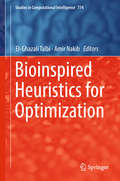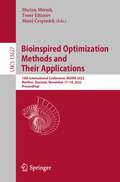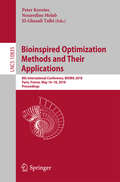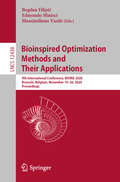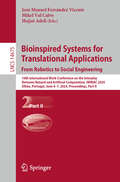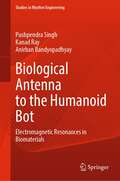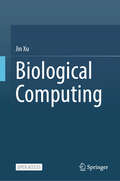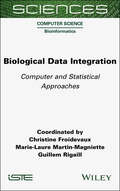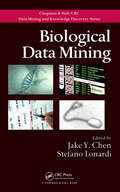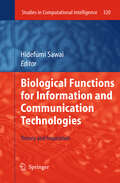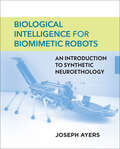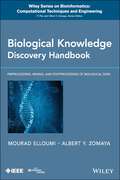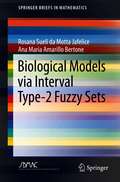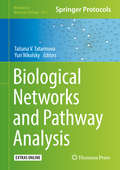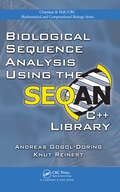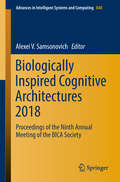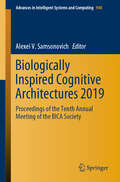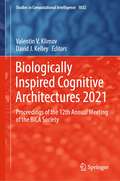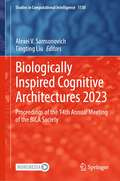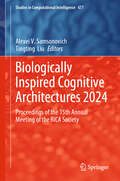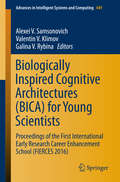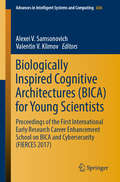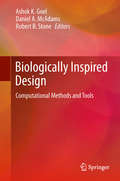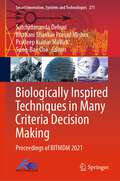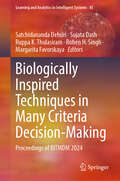- Table View
- List View
Bioinspired Heuristics for Optimization (Studies in Computational Intelligence #774)
by El-Ghazali Talbi Amir NakibThis book presents recent research on bioinspired heuristics for optimization. Learning- based and black-box optimization exhibit some properties of intrinsic parallelization, and can be used for various optimizations problems. Featuring the most relevant work presented at the 6th International Conference on Metaheuristics and Nature Inspired Computing, held at Marrakech (Morocco) from 27th to 31st October 2016, the book presents solutions, methods, algorithms, case studies, and software. It is a valuable resource for research academics and industrial practitioners.
Bioinspired Optimization Methods and Their Applications: 10th International Conference, BIOMA 2022, Maribor, Slovenia, November 17–18, 2022, Proceedings (Lecture Notes in Computer Science #13627)
by Tome Eftimov Marjan Mernik Matej ČrepinšekThis book constitutes the refereed proceedings of the 10th International Conference on Bioinspired Optimization Methods and Their Applications, BIOMA 2022, held in Maribor, Slovenia, in November 2022.The 19 full papers presented in this book were carefully reviewed and selected from 23 submissions.The papers in this BIOMA proceedings specialized in bioinspired algorithms as a means for solving the optimization problems and came in two categories: theoretical studies and methodology advancements on the one hand, and algorithm adjustments and their applications on the other.
Bioinspired Optimization Methods and Their Applications: 8th International Conference, Bioma 2018, Paris, France, May 16-18, 2018, Proceedings (Lecture Notes in Computer Science #10835)
by El-Ghazali Talbi Peter Korošec Nouredine MelabThis book constitutes the thoroughly refereed revised selected papers of the 10th International Conference on Bioinspired Optimization Models and Their Applications, BIOMA 2018, held in Paris, France, in May 2018. The 27 revised full papers were selected from 53 submissions and present papers in all aspects of bioinspired optimization research such as new algorithmic developments, high-impact applications, new research challenges, theoretical contributions, implementation issues, and experimental studies.
Bioinspired Optimization Methods and Their Applications: 9th International Conference, BIOMA 2020, Brussels, Belgium, November 19–20, 2020, Proceedings (Lecture Notes in Computer Science #12438)
by Massimiliano Vasile Edmondo Minisci Bogdan FilipičThis book constitutes the refereed proceedings of the 9th International Conference on Bioinspired Optimization Methods and Their Applications, BIOMA 2020, held in Brussels, Belgium, in November 2020. The 24 full papers presented in this book were carefully reviewed and selected from 68 submissions. The papers in this BIOMA proceedings specialized in bioinspired algorithms as a means for solving the optimization problems and came in two categories: theoretical studies and methodology advancements on the one hand, and algorithm adjustments and their applications on the other. Due to the Corona pandemic BIOMA 2020 was held as a virtual event.
Bioinspired Systems for Translational Applications: 10th International Work-Conference on the Interplay Between Natural and Artificial Computation, IWINAC 2024, Olhâo, Portugal, June 4–7, 2024, Proceedings, Part II (Lecture Notes in Computer Science #14675)
by Hojjat Adeli José Manuel Ferrández Vicente Mikel Val CalvoThe two volume set LNCS 14674 and 14675 constitutes the proceedings of the 10th International Work-Conference on the Interplay Between Natural and Artificial Computation, IWINAC 2024, which took place in Olhâo, Portugal, during June 4–7, 2024. The 99 full papers presented in these proceedings were carefully reviewed and selected from 193 submissions. They were organized in topical sections as follows: Part I: Machine learning in neuroscience; artificial intelligence in neurophysiology; neuromotor and cognitive disorders; intelligent systems for assessment, treatment, and assistance in early stages of Alzheimer's disease and other dementias; socio-cognitive, affective and physiological computing; affective computing and context awareness in ambientintelliigence; learning tools to lecture; Part II: Machine learning in computer vision and robotics; bio-inspired computing approaches; social and civil engineering through human AI translations; smart renewable energies: advancing AI algorithms in the renewable energy industry; bioinspired applications.
Biological Antenna to the Humanoid Bot: Electromagnetic Resonances in Biomaterials (Studies in Rhythm Engineering)
by Kanad Ray Anirban Bandyopadhyay Pushpendra SinghThe book outlines a pathway to the development of fusion of electromagnetic resonance and artificial intelligence which will dominate the world of communication engineering. Electromagnetic resonance is fundamental to all biomaterials. The authors explore the peculiarities of this typical resonance behaviour in the literatures and provide the key points where the research should direct. Biological antennas are inspiring designing of several electromagnetic devices. From biomimetic engineering to humanoid bots a revolution is undergoing. Authors include entire development in the form of a book along with their contribution to this field.
Biological Computing
by Jin XuThis open access book comprehensively introduces biocomputing, focusing on its foundational theories, experimental operations, and computational models. Biocomputing represents an innovative computational paradigm that leverages biomolecules as a carrier for processing and storing information. As a core enabler of human progress, computational tools serve as critical benchmarks of societal advancement and are key drivers of technological innovation. While electronic computers currently dominate as the primary instruments for information processing, their underlying manufacturing technologies are approaching physical and practical limits. This has prompted the search for alternative computational models and tools to meet the demands of future advancements. Over recent decades, scientists have explored various fields to develop novel computational frameworks. These efforts have led to the emergence of groundbreaking paradigms, such as artificial neural networks inspired by brain-like information processing, evolutionary computing based on genetic mechanisms, biocomputing utilizing the unique properties of biomolecules, quantum computing exploiting quantum phenomena, and optical computing leveraging the properties of light. Designed as an essential resource for readers interested in the principles and applications of biocomputing, this book establishes a foundational understanding of the subject while serving as a bridge to more advanced theoretical and practical exploration. A basic knowledge of molecular biology is recommended for readers to engage with the material fully. The translation was done using artificial intelligence. Subsequently, a human revision was done primarily in terms of content.
Biological Data Integration: Computer and Statistical Approaches
by Christine Froidevaux Marie-Laure Martin-Magniette Guillem RigaillThe study of biological data is constantly undergoing profound changes. Firstly, the volume of data available has increased considerably due to new high throughput techniques used for experiments. Secondly, the remarkable progress in both computational and statistical analysis methods and infrastructures has made it possible to process these voluminous data. The resulting challenge concerns our ability to integrate these data, i.e. to use their complementary nature effectively in the hope of advancing our knowledge. Therefore, a major challenge in studying biology today is integrating data for the most exhaustive analysis possible. Biological Data Integration deals in a pedagogical way with research work in biological data science, examining both computational approaches to data integration and statistical approaches to the integration of omics data
Biological Data Mining (Chapman & Hall/CRC Data Mining and Knowledge Discovery Series)
by Stefano Lonardi Jake Y. ChenLike a data-guzzling turbo engine, advanced data mining has been powering post-genome biological studies for two decades. Reflecting this growth, Biological Data Mining presents comprehensive data mining concepts, theories, and applications in current biological and medical research. Each chapter is written by a distinguished team of interdisciplin
Biological Functions for Information and Communication Technologies: Theory and Inspiration (Studies in Computational Intelligence #320)
by Hidefumi SawaiBy incorporating biologically-inspired functions into ICT, various types of new-generation information and communication systems can be created. Just some example of areas already benefiting from such design inspiration are network architectures, information processing, molecular communication, and complex network modeling for solving real world-problems. This book provides the theoretical basis for understanding these developments and explains their practical applications. Highlighted inserts appears throughout to help readers to understand the very latest topics in these emerging research fields. The book ends with a more philosophical discussion on how new ICT solutions can be found by looking at analogous systems in biology. This new way of thinking may help researchers and practitioners to apply innovative ideas in developing next-generation technologies.
Biological Intelligence for Biomimetic Robots: An Introduction to Synthetic Neuroethology
by Joseph AyersAn introduction to how neuroethology can inform the development of robots controlled by synaptic networks instead of algorithms, from a pioneer in biorobotics.The trait most fundamental to the evolution of animals is the capability to adapt to novel circumstances in unpredictable environments. Recent advances in biomimetics have made it feasible to construct robots modeled on such unsupervised autonomous behavior, and animal models provide a library of existence proofs. Filling an important gap in the field, this introductory textbook illuminates how neurobiological principles can inform the development of robots that are controlled by synaptic networks, as opposed to algorithms. Joseph Ayers provides a comprehensive overview of the sensory and motor systems of a variety of model biological systems and shows how their behaviors may be implemented in artificial systems, such as biomimetic robots. Introduces the concept of biological intelligence as applied to robots, building a strategy for autonomy based on the neuroethology of simple animal modelsProvides a mechanistic physiological framework for the control of innate behaviorIllustrates how biomimetic vehicles can be operated in the field persistently and adaptivelyDeveloped by a pioneer in biorobotics with decades of teaching experienceProven in the classroom Suitable for professionals and researchers as well as undergraduate and graduate students in cognitive science and computer science
Biological Knowledge Discovery Handbook: Preprocessing, Mining and Postprocessing of Biological Data (Wiley Series in Bioinformatics #23)
by Mourad Elloumi Albert Y. ZomayaThe first comprehensive overview of preprocessing, mining, and postprocessing of biological data Molecular biology is undergoing exponential growth in both the volume and complexity of biological data—and knowledge discovery offers the capacity to automate complex search and data analysis tasks. This book presents a vast overview of the most recent developments on techniques and approaches in the field of biological knowledge discovery and data mining (KDD)—providing in-depth fundamental and technical field information on the most important topics encountered. Written by top experts, Biological Knowledge Discovery Handbook: Preprocessing, Mining, and Postprocessing of Biological Data covers the three main phases of knowledge discovery (data preprocessing, data processing—also known as data mining—and data postprocessing) and analyzes both verification systems and discovery systems. BIOLOGICAL DATA PREPROCESSING Part A: Biological Data Management Part B: Biological Data Modeling Part C: Biological Feature Extraction Part D Biological Feature Selection BIOLOGICAL DATA MINING Part E: Regression Analysis of Biological Data Part F Biological Data Clustering Part G: Biological Data Classification Part H: Association Rules Learning from Biological Data Part I: Text Mining and Application to Biological Data Part J: High-Performance Computing for Biological Data Mining Combining sound theory with practical applications in molecular biology, Biological Knowledge Discovery Handbook is ideal for courses in bioinformatics and biological KDD as well as for practitioners and professional researchers in computer science, life science, and mathematics.
Biological Models via Interval Type-2 Fuzzy Sets (SpringerBriefs in Mathematics)
by Rosana Sueli Jafelice Ana Maria Amarillo BertoneThis book offers a gentle introduction to type-2 fuzzy sets and, in particular, interval type-2 fuzzy sets and their application in biological modeling. Interval type-2 fuzzy modeling is a comparatively recent direction of research in fuzzy modeling. As the modeling of biological problems is inherently uncertain, the use of fuzzy sets in this field is a natural choice.The coverage begins with a succinct review of type-1 fuzzy basic theory, before providing a comprehensive and didactic explanation of type-2 fuzzy set components. In turn, Fuzzy Rule-Based Systems, or FRBS, are shown for both types, interval type-2 and type-1 fuzzy sets.Applications include the pharmacological models, prediction of prostate cancer stages, a model for HIV population transfer (asymptomatic to symptomatic), an epidemiological disease caused by HIV, some models in population growth, included the Malthus Model, and an epidemic model refers to COVID-19. The book is ideally suited to graduate students in mathematics and related fields, professionals, researchers, or the public interested in interval type-2 fuzzy modeling. Largely self-contained, it can also be used as a supplementary text in specialized graduate courses.
Biological Networks and Pathway Analysis (Methods in Molecular Biology #1613)
by Yuri Nikolsky Tatiana V. TatarinovaIn this volume, expert practitioners present a compilation of methods of functional data analysis (often referred to as "systems biology") and its applications in drug discovery, medicine, and basic disease research. It covers such important issues as the elucidation of protein, compound and gene interactions, as well as analytical tools, including networks, interactome and ontologies, and clinical applications of functional analysis. As a volume in the highly successful Methods in Molecular Biology series, this work provides detailed description and hands-on implementation advice. Reputable, comprehensive, and cutting-edge, Biological Networks and Pathway Analysis presents both "wet lab" experimental methods and computational tools in order to cover a broad spectrum of issues in this fascinating new field.
Biological Sequence Analysis Using the SeqAn C++ Library (Chapman & Hall/CRC Computational Biology Series)
by Andreas Gogol-Döring Knut ReinertAn Easy-to-Use Research Tool for Algorithm Testing and DevelopmentBefore the SeqAn project, there was clearly a lack of available implementations in sequence analysis, even for standard tasks. Implementations of needed algorithmic components were either unavailable or hard to access in third-party monolithic software products. Addressing these conc
Biologically Inspired Cognitive Architectures 2018: Proceedings Of The Ninth Annual Meeting Of The Bica Society (Advances In Intelligent Systems and Computing #848)
by Alexei V. SamsonovichThe book focuses on original approaches intended to support the development of biologically inspired cognitive architectures. It bridges together different disciplines, from classical artificial intelligence to linguistics, from neuro- and social sciences to design and creativity, among others. The chapters, based on contributions presented at the Ninth Annual Meeting of the BICA Society, held in on August 23-24, 2018, in Prague, Czech Republic, discuss emerging methods, theories and ideas towards the realization of general-purpose humanlike artificial intelligence or fostering a better understanding of the ways the human mind works. All in all, the book provides engineers, mathematicians, psychologists, computer scientists and other experts with a timely snapshot of recent research and a source of inspiration for future developments in the broadly intended areas of artificial intelligence and biological inspiration.
Biologically Inspired Cognitive Architectures 2019: Proceedings of the Tenth Annual Meeting of the BICA Society (Advances in Intelligent Systems and Computing #948)
by Alexei V. SamsonovichThe book focuses on original approaches intended to support the development of biologically inspired cognitive architectures. It bridges together different disciplines, from classical artificial intelligence to linguistics, from neuro- and social sciences to design and creativity, among others. The chapters, based on contributions presented at the Tenth Annual Meeting of the BICA Society, held in on August 15-18, 2019, in Seattle, WA, USA, discuss emerging methods, theories and ideas towards the realization of general-purpose humanlike artificial intelligence or fostering a better understanding of the ways the human mind works. All in all, the book provides engineers, mathematicians, psychologists, computer scientists and other experts with a timely snapshot of recent research and a source of inspiration for future developments in the broadly intended areas of artificial intelligence and biological inspiration.
Biologically Inspired Cognitive Architectures 2021: Proceedings of the 12th Annual Meeting of the BICA Society (Studies in Computational Intelligence #1032)
by Valentin V. Klimov David J. KelleyThe book focuses on original approaches intended to support the development of biologically inspired cognitive architectures. It bridges together different disciplines, including artificial intelligence, linguistics, neuro- and social sciences, psychology and philosophy of mind, among others. The chapters are based on contributions presented at the 12th Annual Meeting of the BICA Society (BICA 2021), which consisted of two parallel virtual events: Information in Biologically Inspired Cognitive Architectures based Systems, held during the 2021 Summit of the International Society for the Study of Information, on September 12-19, 2021, from Vienna, Austria, and the 2021 International Workshop on Biologically Inspired Cognitive Architectures, held during the 21st ACM International Conference on Intelligent Virtual Agents, on September 14-17, 2021, from the Fukuchiyama City, Kyoto, Japan. The book discusses emerging methods, theories and ideas towards the realization of general-purpose humanlike artificial intelligence or fostering a better understanding of the ways the human mind works. It provides engineers, mathematicians, psychologists, computer scientists and other experts with a timely snapshot of recent research and a source of inspiration for future developments in the broadly intended areas of artificial intelligence and biological inspiration.
Biologically Inspired Cognitive Architectures 2023: Proceedings of the 14th Annual Meeting of the BICA Society (Studies in Computational Intelligence #1130)
by Alexei V. Samsonovich Tingting LiuThe book focuses on original approaches intended to support the development of biologically inspired cognitive architectures. It bridges together different disciplines, including artificial intelligence, linguistics, neuro- and social sciences, psychology and philosophy of mind, among others. The chapters are based on contributions presented at the 2023 Annual International Conference on Brain-Inspired Cognitive Architectures for Artificial Intelligence (the 14th Annual Meeting of the BICA Society, BICA*AI 2023), organized in collaboration with the University of Ningbo and held on October 13-15, 2023, in Ningbo, China. The book discusses emerging methods, theories and ideas towards the realization of general-purpose humanlike artificial intelligence or fostering a better understanding of the ways the human mind works. It provides engineers, mathematicians, psychologists, computer scientists and other experts with a timely snapshot of recent research and a source of inspiration for future developments in the broadly intended areas of artificial intelligence and biological inspiration.
Biologically Inspired Cognitive Architectures 2024: Proceedings of the 15th Annual Meeting of the BICA Society (Studies in Computational Intelligence #477)
by Alexei V. Samsonovich Tingting LiuThis book reports on original approaches intended to support the development of biologically inspired cognitive architectures. It bridges together different disciplines, including artificial intelligence, linguistics, neuro- and social sciences, psychology and philosophy of mind, among others. The chapters are based on contributions presented at the 2024 Annual International Conference on Brain-Inspired Cognitive Architectures for Artificial Intelligence (the 15th Annual Meeting of the BICA Society, BICA*AI 2024), organized in collaboration with the 17th Conference on Artificial General Intelligence (AGI 2024) and held on August 13-16, 2024, in Seattle, WA, USA. They cover emerging methods, theories and ideas towards the realization of general-purpose humanlike artificial intelligence or fostering a better understanding of the ways the human mind works. All in all, this book provides engineers, mathematicians, psychologists, computer scientists and other experts with a timely snapshot of recent research and a source of inspiration for future developments in the broadly intended areas of artificial intelligence and biological inspiration.
Biologically Inspired Cognitive Architectures: Proceedings of the First International Early Research Career Enhancement School (FIERCES 2016) (Advances in Intelligent Systems and Computing #449)
by Alexei V. Samsonovich Valentin V. Klimov Galina V. RybinaThis book presents cutting-edge research focused on current challenges towards the realization of Biologically Inspired intelligent agents, or Cognitive Architectures (BICA). The chapters are written by both world-recognized experts (including Antonio Chella, Olivier Georgeon, Oliver Kutz, Antonio Lieto, David Vernon, Paul Verschure, and others) and young researchers. Together, they constitute a good mixture of new findings with tutorial-based reviews and position papers, all presented at the First International Early Research Career Enhancement School on Biologically Inspired Cognitive Architectures (FIERCES on BICA 2016), held April 21-24 in Moscow, Russia. Most works included here cross boundaries between disciplines: from neuroscience to social science, from cognitive science to robotics, and from bioengineering to artificial intelligence. A special emphasis is given to novel solutions to urgent problems that have been resisting traditional approaches for decades. Intended for providing readers with an update on biologically inspired approaches towards the computational replication of all the essential aspects of the human mind (the BICA Challenge), this book is expected to foster lively discussions on the topic and stimulate cross-disciplinary, cross-generation and cross-cultural collaboration.
Biologically Inspired Cognitive Architectures: Proceedings of the First International Early Research Career Enhancement School on BICA and Cybersecurity (FIERCES 2017) (Advances in Intelligent Systems and Computing #636)
by Alexei V. Samsonovich Valentin V. KlimovThis book presents cutting-edge research focused on current challenges towards the realization of Biologically Inspired intelligent agents, or Cognitive Architectures (BICA). The chapters are written by both world-recognized experts (including Antonio Chella, Olivier Georgeon, Oliver Kutz, Antonio Lieto, David Vernon, Paul Verschure, and others) and young researchers. Together, they constitute a good mixture of new findings with tutorial-based reviews and position papers, all presented at the First International Early Research Career Enhancement School on Biologically Inspired Cognitive Architectures (FIERCES on BICA 2016), held April 21-24 in Moscow, Russia. Most works included here cross boundaries between disciplines: from neuroscience to social science, from cognitive science to robotics, and from bioengineering to artificial intelligence. A special emphasis is given to novel solutions to urgent problems that have been resisting traditional approaches for decades. Intended for providing readers with an update on biologically inspired approaches towards the computational replication of all the essential aspects of the human mind (the BICA Challenge), this book is expected to foster lively discussions on the topic and stimulate cross-disciplinary, cross-generation and cross-cultural collaboration.
Biologically Inspired Design: Computational Methods and Tools
by Robert B. Stone Daniel A Mcadams Ashok K GoelFrom simple cases such as hook and latch attachments found in Velcro to articulated-wing flying vehicles, biology often has been used to inspire many creative design ideas. The scientific challenge now is to transform the paradigm into a repeatable and scalable methodology. Biologically Inspired Design explores computational techniques and tools that can help integrate the method into design practice. With an inspiring foreword from Janine Benyus, Biologically Inspired Design contains a dozen chapters written by some of the leading scholars in the transdisciplinary field of bioinspired design, such as Frank Fish, Julian Vincent and Jeannette Yen from biology, and Amaresk Chakrabarti, Satyandra Gupta and Li Shu from engineering. Based in part on discussions at two workshops sponsored by the United States National Science Foundation, this volume introduces and develops several methods and tools for bioinspired design including: Information-processing theories, Natural language techniques, Knowledge-based tools, and Functional approaches and Pedagogical techniques. By exploring these fundamental theories, techniques and tools for supporting biologically inspired design, this volume provides a comprehensive resource for design practitioners wishing to explore the paradigm, an invaluable guide to design educators interested in teaching the method, and a preliminary reading for design researchers wanting to investigate bioinspired design.
Biologically Inspired Techniques in Many Criteria Decision Making: Proceedings of BITMDM 2021 (Smart Innovation, Systems and Technologies #271)
by Bhabani Shankar Prasad Mishra Satchidananda Dehuri Pradeep Kumar Mallick Sung-Bae ChoThis book includes best-selected, high-quality research papers presented at Second International Conference on Biologically Inspired Techniques in Many Criteria Decision Making (BITMDM 2021) organized by Department of Information & Communication Technology, Fakir Mohan University, Balasore, Odisha, India, during December 20-21, 2021. This proceeding presents the recent advances in techniques which are biologically inspired and their usage in the field of many criteria decision making. The topics covered are biologically inspired algorithms, nature-inspired algorithms, multi-criteria optimization, multi-criteria decision making, data mining, big-data analysis, cloud computing, IOT, machine learning and soft computing, smart technologies, crypt-analysis, cognitive informatics, computational intelligence, artificial intelligence and machine learning, data management exploration and mining, computational intelligence, and signal and image processing.
Biologically Inspired Techniques in Many Criteria Decision-Making: Proceedings of BITMDM 2024 (Learning and Analytics in Intelligent Systems #45)
by Satchidananda Dehuri Margarita Favorskaya Sujata Dash Ruppa K. Thulasiram Rohen H. SinghThis book includes selected high-quality research papers presented at 3rd International Conference on Biologically Inspired Techniques in Many Criteria Decision Making (BITMDM 2024) organized by School of Engineering and Technology, Nagaland University, Dimapur, India on 6th and 7th December 2024. This book presents the recent advances in techniques which are biologically inspired and their usage in the field of single and many criteria decision making. Further, the topics covered in this book are divided into different sections like: i) healthcare and biomedical applications, ii) security, fraud detection, and cybersecurity, iii) intelligent systems and decision support, iv) agriculture and environment, v) image processing and multi-media analysis, and vi) emerging technologies and applications.
